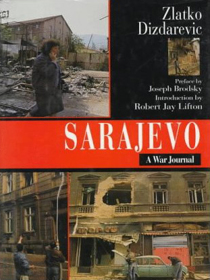Search -
Sarajevo: A War Journal
Sarajevo A War Journal
Author:
Reprinted from Oslobodenje, a Sarajevo newspaper, these beautifully crafted essays reflect everyday existence in a city under continual bombardment, from April 1992 to January 1993. Dizdarevic, editor of the newspaper and a writer with a distinctive voice, conveys the hellish scene impressionistically: a burial under sniper fire; a boy compulsiv... more »
Author:
Reprinted from Oslobodenje, a Sarajevo newspaper, these beautifully crafted essays reflect everyday existence in a city under continual bombardment, from April 1992 to January 1993. Dizdarevic, editor of the newspaper and a writer with a distinctive voice, conveys the hellish scene impressionistically: a burial under sniper fire; a boy compulsiv... more »
ISBN-13: 9780805035353
ISBN-10: 0805035354
Publication Date: 11/1994
Pages: 208
Rating: 3
ISBN-10: 0805035354
Publication Date: 11/1994
Pages: 208
Rating: 3
3.3 stars, based on 3 ratings
Publisher: Henry Holt Co (P)
Book Type: Paperback
Other Versions: Hardcover
Members Wishing: 0
Reviews: Amazon | Write a Review
Book Type: Paperback
Other Versions: Hardcover
Members Wishing: 0
Reviews: Amazon | Write a Review
Genres:
- History >> Europe >> Bosnia and Herzegovina
- History >> Europe >> Yugoslavia




